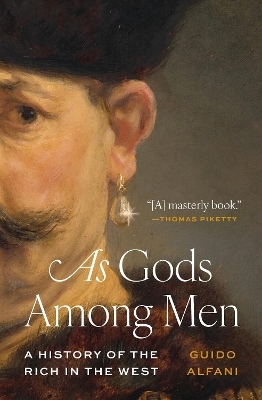
As Gods Among Men
A History of the Rich in the West
Seiten
2025
Princeton University Press (Verlag)
978-0-691-22711-5 (ISBN)
Princeton University Press (Verlag)
978-0-691-22711-5 (ISBN)
- Noch nicht erschienen (ca. April 2025)
- Portofrei ab CHF 40
- Auch auf Rechnung
- Artikel merken
"In this masterly book, [Alfani] offers an insightful long-run perspective and fascinating lessons for the future. A must-read!"—Thomas Piketty, author of Capital in the Twenty-First Century
A sweeping narrative that shows how the rich historically justified themselves by helping their societies in times of crisis, why they no longer do, and what that may mean for social stability
The rich have always fascinated, sometimes in problematic ways. Medieval thinkers feared that the super-rich would act 'as gods among men’; much more recently Thomas Piketty made wealth central to discussions of inequality. In this book, Guido Alfani offers a history of the rich and super-rich in the West, examining who they were, how they accumulated their wealth and what role they played in society. Covering the last thousand years, with frequent incursions into antiquity, and integrating recent research on economic inequality, Alfani finds—despite the different paths to wealth in different eras—fundamental continuities in the behaviour of the rich and public attitudes towards wealth across Western history. His account offers a novel perspective on current debates about wealth and income disparity.
Alfani argues that the position of the rich and super-rich in Western society has always been intrinsically fragile; their very presence has inspired social unease. In the Middle Ages, an excessive accumulation of wealth was considered sinful; the rich were expected not to appear to be wealthy. Eventually, the rich were deemed useful when they used their wealth to help their communities in times of crisis. Yet in the twenty-first century, Alfani points out, the rich and the super-rich—their wealth largely preserved through the Great Recession and COVID-19—have been exceptionally reluctant to contribute to the common good in times of crisis, rejecting even such stopgap measures as temporary tax increases. History suggests that this is a troubling development—for the rich, and for everyone else.
A sweeping narrative that shows how the rich historically justified themselves by helping their societies in times of crisis, why they no longer do, and what that may mean for social stability
The rich have always fascinated, sometimes in problematic ways. Medieval thinkers feared that the super-rich would act 'as gods among men’; much more recently Thomas Piketty made wealth central to discussions of inequality. In this book, Guido Alfani offers a history of the rich and super-rich in the West, examining who they were, how they accumulated their wealth and what role they played in society. Covering the last thousand years, with frequent incursions into antiquity, and integrating recent research on economic inequality, Alfani finds—despite the different paths to wealth in different eras—fundamental continuities in the behaviour of the rich and public attitudes towards wealth across Western history. His account offers a novel perspective on current debates about wealth and income disparity.
Alfani argues that the position of the rich and super-rich in Western society has always been intrinsically fragile; their very presence has inspired social unease. In the Middle Ages, an excessive accumulation of wealth was considered sinful; the rich were expected not to appear to be wealthy. Eventually, the rich were deemed useful when they used their wealth to help their communities in times of crisis. Yet in the twenty-first century, Alfani points out, the rich and the super-rich—their wealth largely preserved through the Great Recession and COVID-19—have been exceptionally reluctant to contribute to the common good in times of crisis, rejecting even such stopgap measures as temporary tax increases. History suggests that this is a troubling development—for the rich, and for everyone else.
Guido Alfani is professor of economic history at Bocconi University, Milan. He is the author of Calamities and the Economy in Renaissance Italy: The Grand Tour of the Horsemen of the Apocalypse and the coauthor of The Lion’s Share: Inequality and the Rise of the Fiscal State in Preindustrial Europe.
| Erscheint lt. Verlag | 22.4.2025 |
|---|---|
| Zusatzinfo | 11 b/w illus. 5 tables. |
| Verlagsort | New Jersey |
| Sprache | englisch |
| Maße | 133 x 203 mm |
| Themenwelt | Geschichte ► Teilgebiete der Geschichte ► Kulturgeschichte |
| Geschichte ► Teilgebiete der Geschichte ► Wirtschaftsgeschichte | |
| Wirtschaft ► Volkswirtschaftslehre ► Wirtschaftspolitik | |
| ISBN-10 | 0-691-22711-X / 069122711X |
| ISBN-13 | 978-0-691-22711-5 / 9780691227115 |
| Zustand | Neuware |
| Informationen gemäß Produktsicherheitsverordnung (GPSR) | |
| Haben Sie eine Frage zum Produkt? |
Mehr entdecken
aus dem Bereich
aus dem Bereich
der stille Abschied vom bäuerlichen Leben in Deutschland
Buch | Hardcover (2023)
C.H.Beck (Verlag)
CHF 32,15
vom Mittelalter bis zur Gegenwart
Buch | Softcover (2024)
C.H.Beck (Verlag)
CHF 16,80


